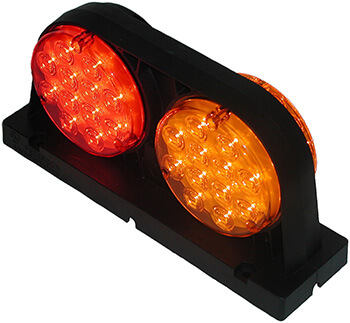Safely light the way
Sep 30, 2019

It won’t be long until we roll the clocks back an hour, meaning the days will become shorter. But there’s still work to be done. Many of us will start working from before sunup until after dark, so it’s imperative we have adequate lighting for our tractors and trailers to avoid jeopardizing safety.
Now is the time to check your lights. Dirt and debris can become caked on your headlights and taillights, reducing their brightness. Take a moment to clean them off with a damp, soft rag. Also, your light covers may become cloudy or yellowed which can diminish their effectiveness. Household products such as dish soap, baking soda, vinegar, or toothpaste can help restore them.
Or, it may simply be time to upgrade your lighting from the standard bulbs that came with the equipment. A typical halogen bulb has a lifespan of about 1,000 hours but can be dim compared to other options. Consider switching to LED headlights and taillights, which are brighter, more energy efficient, use less power, and have a lifespan of up to 10 years. Co-op is proud to partner with Peterson Manufacturing, the industry leader in supplying OE (orginial equipment) to offer “Solutions on the Move” when it comes to LED, Incandescent, and Specialty lighting.
Co-op stocks more than 125 Peterson products and has access to many more. Peterson is the first North American lighting manufacturer to receive ISO 9001/QS-9000 certification and also the first to receive Caterpillar’s Supplier Quality Excellence Award.
Visit with the professionals at your local Co-op for advice in selecting the right Peterson lighting products. They’ll gladly help you “light the way!”
Now is the time to check your lights. Dirt and debris can become caked on your headlights and taillights, reducing their brightness. Take a moment to clean them off with a damp, soft rag. Also, your light covers may become cloudy or yellowed which can diminish their effectiveness. Household products such as dish soap, baking soda, vinegar, or toothpaste can help restore them.
Or, it may simply be time to upgrade your lighting from the standard bulbs that came with the equipment. A typical halogen bulb has a lifespan of about 1,000 hours but can be dim compared to other options. Consider switching to LED headlights and taillights, which are brighter, more energy efficient, use less power, and have a lifespan of up to 10 years. Co-op is proud to partner with Peterson Manufacturing, the industry leader in supplying OE (orginial equipment) to offer “Solutions on the Move” when it comes to LED, Incandescent, and Specialty lighting.
Co-op stocks more than 125 Peterson products and has access to many more. Peterson is the first North American lighting manufacturer to receive ISO 9001/QS-9000 certification and also the first to receive Caterpillar’s Supplier Quality Excellence Award.
Visit with the professionals at your local Co-op for advice in selecting the right Peterson lighting products. They’ll gladly help you “light the way!”